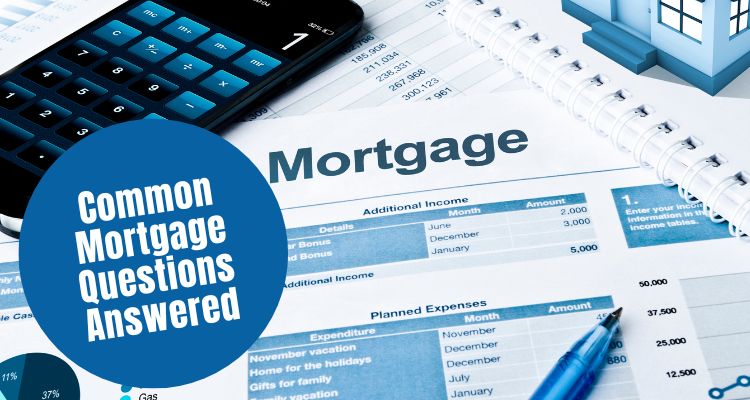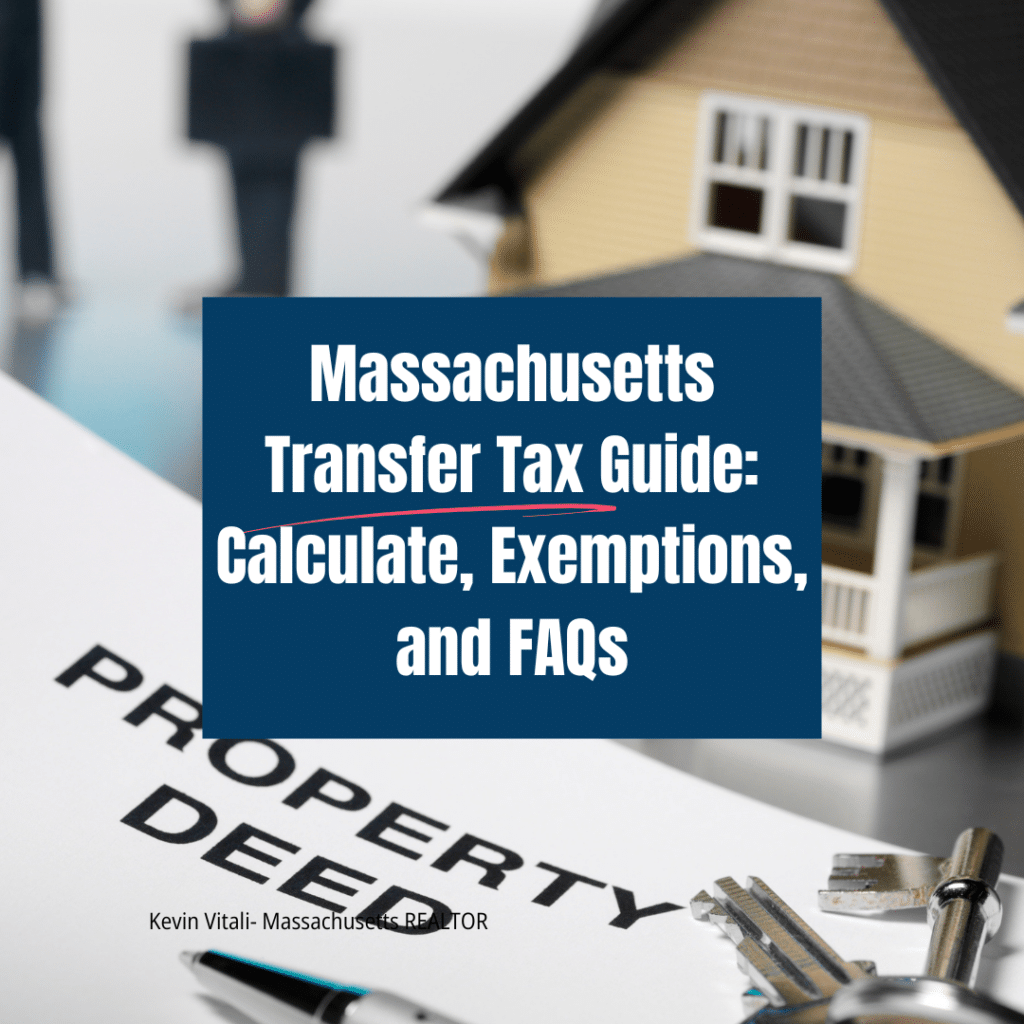
One of the first questions in real estate revolves around the initial steps of buying a home. It’s essential to start with a mortgage pre-approval, which involves a thorough review of your credit profile, income, and assets.
This step determines how much house you can afford and helps you set a realistic budget. Working with an experienced real estate agent is equally important, as they can guide you through the process, provide valuable insights, and effectively represent your interests.
Understanding the market conditions is vital for those looking to sell a property. Knowing whether you are in a buyer’s or seller’s market can significantly impact your strategy and expectations.
Additionally, Massachusetts home sellers must be aware of the costs associated with selling a home, such as real estate commissions, tax stamps, and other fees. Properly preparing your home for sale by decluttering, making minor repairs, and enhancing curb appeal can also be crucial in attracting potential buyers and achieving a successful sale. Let’s dive into some of the most common questions home buyers and sellers have and answer these real estate FAQs.
Jump To A Section....
FAQs in Real Estate: General Real Estate Questions
1- What is the first step in buying a home?
One of the most common real estate FAQs is what the first steps in buying a home are. First, you should sit down with a mortgage originator and get a proper mortgage pre-approval based on your circumstances. This will include a review of your credit profile, income, and assets.
Once you know how much house you can qualify for, you can assemble a budget you are comfortable with based on real numbers.
Understanding all the financial considerations of buying a home can help prevent dissatisfaction after you move into your new home.
2- How do I find a real estate agent?
Working with a buyer agent representing your interest is critical to your home-buying success. I always tell buyers you don’t know what you don’t know. An experienced real estate agent spends their day immersed in real estate.
Start by googling agents in the area you want to buy a home. Ask friends and family for referrals. Read online reviews and narrow down to three agents.
Once you have a short list, schedule a buyer consultation with each and find the one you feel you can work with. Remember, you will spend significant time and rely on your real estate agent for many things. Make sure you have a good working relationship with your agent.
3– What is the difference between a buyer’s and a seller’s market?
Understanding the type of real estate market you are in is critical to successfully purchasing your new home. A seller’s market means the market favors sellers. And buyers need to work hard to write an offer that catches a seller’s attention.
Conversely, a buyer’s market favors the buyer, and they can often negotiate hard with home sellers.
Market conditions dictate how a home buyer or seller will spend their time in the market. Trying to go against the market will lead to disappointment and it is essential to know the current market conditions.
4- What is a mortgage and how does it work?
Most buyers will need to secure a mortgage to buy a home. A mortgage is a type of loan secured by the house itself. The borrower will usually repay the loan within 15 or 30 periods.
When you hear the term mortgage, it is the instrument recorded at the registry of deeds in which you agree to secure the home loan with the home itself. The mortgage further states that the lender can foreclose on your home if you do not pay.
The most common home loan is a Conventional 30-year conventional loan. However, many different loan programs suit individual needs.
Real Estate FAQs: Home Selling Process
5- How do I determine the value of my home?
The most common method of determining your home’s selling price is to have your local REALTOR prepare a Comparative Market Analysis (CMA).
A CMA is a report that compares similar homes to yours based on location, age, condition, size, features, and amenities. Adjustments may be made based on the inferiority or superiority of the subject property. The report will give a range of fair market values of similar homes, and the REALTOR will suggest a most likely sale price.
6- What are the costs associated with selling a home?
Selling your home will have costs associated with it. Some of the more common costs are:
- Real Estate Commissions
- Tax Stamps
- Mortgage Payoffs
- Wiring Fees
- Smoke Certificate
- Municipal Lien Certificate
Consult with your real estate agent about the costs of selling your home and ask for a net sheet that will estimate the proceeds you will walk away with at closing.
7- How should I prepare my home for sale?
Preparing your home for sale involves several key steps to make it more appealing to potential buyers. Start by decluttering and deep cleaning every room, as a clean, clutter-free home allows buyers to envision themselves in the space.
Address minor repairs such as leaky faucets, cracked tiles, or chipped paint. Consider neutralizing your home’s decor by painting walls in neutral colors and removing personal items, helping buyers imagine their own belongings in the space.
Next, enhance your home’s curb appeal since the exterior is what buyers see. Mow the lawn, trim hedges, and add some potted plants or flowers to create an inviting entrance.
Stage the interior by arranging furniture to highlight the home’s best features and create a welcoming atmosphere. Good lighting is crucial, so ensure all areas are well-lit and consider adding light fixtures or brighter bulbs where needed.
By taking these steps, you can create a positive first impression and potentially increase the sale price of your home.
8- What is the process of listing my home?
Listing a home involves several critical steps to ensure a successful sale. First, select a reputable real estate agent to guide you through the process. Your agent will conduct a comparative market analysis to determine a competitive listing price based on recent sales of similar homes in your area.
After setting the price, you’ll need to prepare your home for showings by decluttering, cleaning, and staging it to appeal to potential buyers.
Next, your agent will market the home using professional photography, online listings, social media, and open houses to attract buyers. They will also handle inquiries and schedule showings.
Once offers start coming in, your agent will help you evaluate them and negotiate terms to reach the best possible agreement. After accepting an offer, the process moves to the closing stage, where inspections, appraisals, and final paperwork are completed before the sale is finalized.
9- How long does it usually take to sell a home?
The time it takes to sell a home can vary widely based on several factors, including market conditions, location, and the home’s condition.
On average, homes in a balanced market might take about 30 to 60 days to receive an offer. However, in a seller’s market with high demand and low inventory, homes can sell much faster, sometimes within days or weeks.
Conversely, in a buyer’s market, where there are more homes for sale than buyers, it can take several months to sell a home.
Other factors influencing the sale timeline include the home’s pricing strategy, marketing efforts, and seasonality. Correctly priced homes that are well-marketed and in good condition tend to sell more quickly. Additionally, the time of year can impact how long a home stays on the market, with spring and summer often being peak seasons for home sales. Working with an experienced real estate agent can help optimize these variables to achieve a quicker sale.
Real Estate FAQs: Home Buying Process

10- What should I look for when touring a home?
When touring a home, pay close attention to its overall condition. Look for signs of wear and tear, such as cracks in the walls, water stains, or outdated systems. Check the functionality of major appliances and fixtures, and note the quality of materials used in the home.
Ensure that the layout fits your needs and that the flow of the rooms makes sense for your lifestyle.
Additionally, evaluate the neighborhood for safety, amenities, and overall appeal. Consider the proximity to schools, parks, shopping centers, and your workplace. Observe the condition of nearby homes and the community’s vibe, as these elements can significantly impact your long-term satisfaction with the property.
Ensure the home will suit your short-term needs and be an excellent home for you and your family for many years.
11- How do I make an offer on a home?
Making an offer on a home involves several steps to ensure your bid. First, work with your real estate agent to determine an appropriate offer price based on comparable home sales, the home’s condition, and current market conditions. Discuss a negotiating strategy that suits you with your REALTOR.
Once your offer is submitted, the seller can accept, reject, or counter it. If they counter, you may need to negotiate terms until both parties reach an agreement.
After accepting the offer, you’ll typically need to provide an earnest money deposit to show your commitment. The next steps include scheduling a home inspection, securing financing, and preparing for the closing process to finalize the purchase.
12- What is a home inspection and why is it important?
A home inspection is a thorough examination of a property’s condition conducted by a licensed inspector. The inspector assesses the home’s structural integrity, plumbing, electrical systems, roof, HVAC, and other critical components. This process helps identify any existing or potential issues that may not be visible during a casual walkthrough.
The importance of a home inspection lies in its ability to uncover problems that could affect the home’s value, safety, and livability. For buyers, it provides crucial information to make an informed decision and negotiate repairs or price adjustments with the seller.
For sellers, it can highlight areas needing attention before listing, potentially speeding up the sale process.
13- What are home buyer closing costs?
Home buyers can expect closing costs to include various fees and expenses incurred during the final stages of purchasing a property. These typically range from 1% to 3% of the home’s purchase price and can include loan origination fees, appraisal fees, title insurance, and attorney fees.
Other typical costs are home inspection fees, property taxes, and prepaid homeowner’s insurance. Buyers might also encounter charges for recording the deed and transferring ownership.
It’s crucial to review the lender’s Closing Disclosure, which details all closing costs, before finalizing the purchase to avoid surprises and ensure all fees are understood and accounted for. Your buyer’s agent can help you review your closing disclosure.
14- How does the closing process work?
The closing process is the final step in buying a home, involving completing all legal and financial transactions required to transfer ownership from the seller to the buyer.
Initially, the buyer reviews and signs various documents, including the purchase agreement, mortgage loan, and title documents. This step ensures all terms and conditions are agreed upon and legally binding.
Ensure you schedule a final walkthrough just before closing on your new home to ensure the property is being delivered as agreed to in the purchase and sale contract.
Next, the buyer pays the closing costs, which cover expenses such as appraisal fees, title insurance, and attorney fees. Once all documents are signed and payments are made, the lender releases the funds to the seller, and the title company records the new deed with the local registry of deeds. The buyer then receives the keys to their new home, officially completing the purchase.
Welcome home!!
Real Estate FAQs: Financing and Mortgages

15- What types of mortgages are available?
Several types of mortgages are available to homebuyers, each catering to different financial needs and circumstances.
Fixed-rate mortgages offer a stable interest rate and consistent monthly payments over the life of the loan, making them ideal for those who prefer predictability. Adjustable-rate mortgages (ARMs) have interest rates that fluctuate based on market conditions, typically starting with a lower rate that adjusts periodically. This can benefit buyers planning to sell or refinance before the adjustment period.
Government-backed loans include options like FHA, VA, and USDA loans, each designed to assist specific groups of buyers. FHA loans, insured by the Federal Housing Administration, require lower down payments and are accessible to buyers with lower credit scores. VA loans, guaranteed by the Department of Veterans Affairs, offer favorable terms for military veterans and active service members. USDA loans, backed by the U.S. Department of Agriculture, target rural property buyers, often with no down payment required.
Each mortgage type has unique benefits and eligibility requirements, making it essential for buyers to explore their options and choose the best fit for their financial situation.
16- What credit score is needed to buy a home?
The credit score needed to buy a home can vary based on the type of mortgage and the lender’s requirements. Generally, a minimum credit score of 620 is required for conventional loans, though higher scores may be necessary for better terms and interest rates.
FHA or Federal Housing Authority loans are more lenient, often accepting scores as low as 580, and in some cases, even 500, with a larger down payment.
The minimum credit score for VA and USDA loans, which cater to veterans and rural property buyers, respectively, can also vary. VA loans typically require a score of around 620, while USDA loans often accept scores as low as 640. Potential buyers should check with specific lenders, as requirements can differ.
Improving your credit score before applying can increase your chances of approval and secure better loan terms. Not only are your odds of qualifying elevated, but your credit score dictates the loan programs available to you and the interest rate you are offered.
17- How much should I save for a down payment?
The amount you need for a down payment on a home depends on the type of mortgage and your financial goals.
For conventional loans, a down payment is 20% of the home’s purchase price to help you avoid private mortgage insurance (PMI) and secure better interest rates. However, many lenders offer options with lower down payments, such as 5% or even 3%, though these usually come with higher monthly payments and private mortgage insurance.
Government-backed loans have different requirements, like FHA, VA, and USDA loans. FHA loans often require as little as 3.5% down, making them accessible for buyers with limited savings. VA loans for veterans and active-duty service members can offer zero down payment options, while USDA loans for rural properties also typically require no down payment. Evaluating your financial situation and long-term goals is essential to determine the right down payment amount for your needs.
18- What is pre-approval and why is it important?
Obtaining a pre-approval is a part of the home buying process, where a lender evaluates your financial situation and creditworthiness to determine the maximum loan amount you qualify for.
This involves a detailed review of your income, assets, credit score, and debts. The lender then provides a pre-approval letter stating the loan amount you are eligible for, typically valid for up to 90 days.
The importance of pre-approval lies in its ability to strengthen your buying position. Sellers and real estate agents take pre-approved buyers more seriously, knowing they have secured financing. This can give you a competitive edge in a hot market where multiple offers are common.
Additionally, pre-approval helps you set a realistic budget and streamlines the buying process by identifying potential financial obstacles early on.
Real EstateFAQs: Legal and Tax Considerations
19- What are the legal steps to sell a home?
Selling a home involves several legal steps to ensure a smooth transaction. First, you must provide mandatory disclosures about the property’s condition, including any known defects or issues. These disclosures protect the buyer and comply with state and local laws.
Next, a purchase agreement or contract is drafted, outlining the terms of the sale, including the price, contingencies, and closing date. This contract must be signed by both parties to become legally binding.
Sellers must also ensure compliance with local laws and regulations, including obtaining necessary permits and potentially closing out open building permits, or inspections, like smoke detector compliance. Title searches and insurance are also essential to verify ownership and address any liens or claims against the property.
Finally, all relevant documents are reviewed and signed during the closing process, and the deed is transferred to the buyer, completing the sale. Working with a real estate attorney or agent can help navigate these legal requirements effectively.
20- How do property taxes work?
Property taxes are calculated based on the assessed value of your property and the tax rate set by your local government. The assessed value is determined by the local tax assessor, who evaluates your property’s value. This value is then multiplied by the local tax rate, often expressed as a percentage or mill rate (amount per $1,000 of assessed value), to determine your annual property tax amount.
Property taxes are typically paid annually or semi-annually, with due dates varying by location. For buyers, property taxes are prorated at closing, meaning the seller pays for the portion of the year they owned the home, and the buyer covers the rest. For sellers, keeping property taxes current is crucial to avoid complications during the sale.
These taxes fund essential public services like schools, police, and infrastructure, making timely payments essential for community well-being. Sellers should not assume the assessed value is the market value or what a home could sell for when presented to the public.
21- What is title insurance and do I need it?
Title insurance is crucial in protecting against legal disputes over property ownership. It safeguards buyers and lenders from potential issues such as unpaid liens, undisclosed heirs, or fraud that could challenge the property’s title. By conducting a thorough title search and providing insurance, this policy ensures that any claims against the property are addressed, giving buyers peace of mind.
Moreover, title insurance covers legal fees and losses if a dispute arises, preventing costly litigation for the homeowner. It provides long-term protection, as the policy remains in effect if the owner or their heirs are interested in the property. This security makes it an essential part of the real estate transaction process.
If you are financing your home through a lending institution, they will require title insurance. But, if you are paying cash, it is not required, though you should consider purchasing it.
22- What are capital gains taxes and how do they affect home sales?
Capital gains taxes are levied on the profit realized from the sale of a property or investment. When selling a home, the difference between the selling price and the purchase price (plus any improvements) constitutes the capital gain.
This gain is subject to taxation, which can vary depending on how long the property was owned and the seller’s tax bracket. For short-term holdings (less than a year), the gain is taxed at the same rate as ordinary income, while long-term holdings (more than a year) benefit from lower tax rates.
However, there are significant exemptions for home sellers that can reduce or even eliminate capital gains taxes. The most notable is the primary residence exclusion, allowing single filers to exclude up to $250,000 of capital gains and married couples filing jointly up to $500,000, provided they have lived in the home for at least two of the last five years.
Additionally, certain home selling expenses, such as agent commissions and home improvements, can be deducted from the profit, further reducing the taxable gain. These exemptions aim to encourage homeownership and provide relief to those selling their primary residences.
Real Estate FAQs: Special Circumstances
23- How do I sell a home in probate?
Selling a home in probate involves several legal steps and requirements. First, you’ll need to get the court’s permission to sell the property, which typically requires filing a petition with the probate court. This process includes notifying all heirs and beneficiaries, and possibly attending a court hearing.
Once you have the court’s approval, you can list the property for sale, but you must follow any specific guidelines set by the probate court, such as obtaining a certain price or having the sale supervised by the court.
The timeline for selling a home in probate can vary, but it generally takes longer than a standard real estate transaction. The probate process can take several months to over a year, depending on the complexity of the estate and whether there are any disputes among heirs. Upon court approval, you will get a document called a license to sell, which will allow you to complete the transaction.
Once the property is sold, the proceeds are distributed according to the will or state law if there is no will. It is essential to work with an experienced probate attorney to navigate this process and ensure all legal requirements are met.
24- What should I know about selling a rental property?
Tenants have legal protections that vary by jurisdiction, so understanding these laws is essential. For instance, if a tenant has a long-term lease, the new owner must honor that agreement.
Alternatively, if the property is sold with tenants on a month-to-month lease, proper notice must be given according to local regulations before requiring them to vacate.
Additionally, clear communication with your tenants is vital throughout the process. Inform them of your intention to sell and any potential impacts on their living situation. Maintaining a cooperative relationship can help facilitate property showings and ensure a smoother sale.
Lastly, consider how the timing of the sale might affect your tenants and plan accordingly to minimize disruptions.
Conclusion To Real Estate FAQs
Being well-informed about real estate processes is essential for both buyers and sellers. Understanding the intricacies of the market, from securing a mortgage pre-approval to preparing a home for sale, can significantly impact your success and satisfaction in real estate transactions.
By familiarizing yourself with common questions and FAQs for real estate and their answers, you are better equipped to navigate the complexities of buying or selling a home.
It’s also crucial to recognize that every real estate situation is unique. Seeking professional advice tailored to your specific circumstances can make a difference. Real estate agents, mortgage originators, and attorneys can provide personalized guidance and support, ensuring you make informed decisions that align with your goals and financial situation.
I hope answering these common real estate FAQs is helpful.

Author Bio
Kevin Vitali is a Massachusetts REALTOR out of Haverhill MA that serves Essex County and Northern Middlesex County in Massachusetts. If you want to buy or sell a home, let me use my years of experience to get you the best possible outcome.
Feel free to contact me to discuss any upcoming moves. I am always happy to answer your questions
Call 978-360-0422 Email kevin@kevinvitali.com






